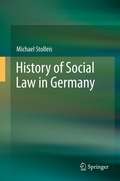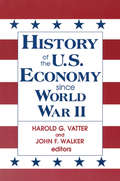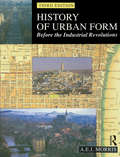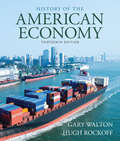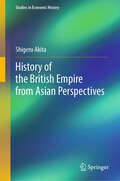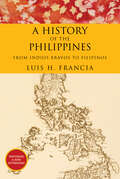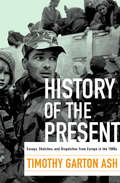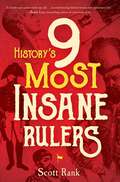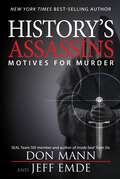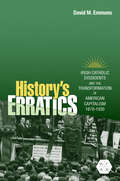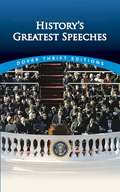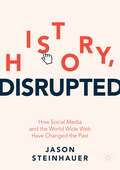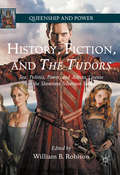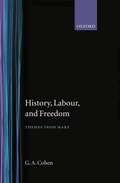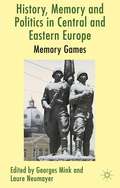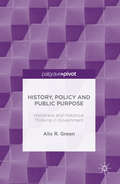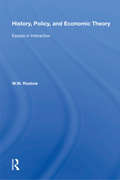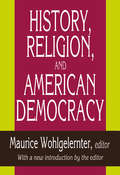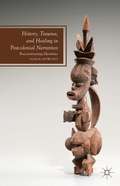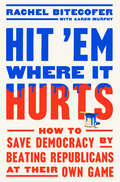- Table View
- List View
History of Social Law in Germany
by Michael StolleisThe sole available comprehensive history of social law and the model of social welfare in Germany. The book explains the origins since the medieval times, but concentrates on the 19th and 20th centuries, especially on the introduction of the social insurance 1881-1889, of the expansion of the system in the Weimar Republic, under the Nazi-System and after World War II in the FRG and the GDR. The system of social welfare in Germany is one of the pillars of economic stability.
History of US Economy Since World War II
by Harold G. Vatter John F. WalkerA collection of articles covering the economic history of the US over the last 50 years. It is selective in its coverage of important issues not often treated historically, such as the economics of medical care and the educational system.
History of Ukraine - 2nd, Revised Edition
by Paul Robert MagocsiFirst published in 1996, A History of Ukraine quickly became the authoritative account of the evolution of Europe's second largest country. In this fully revised and expanded second edition, Paul Robert Magocsi examines recent developments in the country's history and uses new scholarship in order to expand our conception of the Ukrainian historical narrative.New chapters deal with the Crimean Khanate in the sixteenth and seventeenth centuries, and new research on the pre-historic Trypillians, the Italians of the Crimea and the Black Death, the Karaites, Ottoman and Crimean slavery, Soviet-era ethnic cleansing, and the Orange Revolution is incorporated. Magocsi has also thoroughly updated the many maps that appear throughout.Maintaining his depiction of the multicultural reality of past and present Ukraine, Magocsi has added new information on Ukraine's peoples and discusses Ukraine's diasporas. Comprehensive, innovative, and geared towards teaching, the second edition of A History of Ukraine is ideal for both teachers and students.
History of Urban Form Before the Industrial Revolution
by A.E.J. MorrisProvides an international history of urban development, from its origins to the industrial revolution. This well established book maintains the high standard of information found in the previous two editions, describing the physical results of some 5000 years of urban activity. It explains and develops the concept of 'unplanned' cities that grow organically, in contrast with 'planned' cities that were shaped in response to urban form determinants. Spread throughout the texts are copious illustrations from a wealth of sources, including cartographic urban records, aerial and other photographs, original drawings and the author's numerous analytical line drawings.
History of the American Economy: War And The Us Economy From The Spanish-American War To The Persian Gulf War (New Approaches To Economic And Social History Series)
by Hugh Rockoff Gary M. WaltonEver wonder how the American economy became the most powerful one in the world? Tying America's past to the economic policies of today and beyond, the popular HISTORY OF THE AMERICAN ECONOMY, 13E answers this critical question and more, presenting events chronologically for easy understanding. This prestigious book has been used by more learners than any other of its kind in the U.S. Market-leading HISTORY OF THE AMERICAN ECONOMY has helped generations of learners understand how the American economy evolved. Completely updated with recent research by economic historians, this trusted book ties this country’s past to the policies and debates of today and beyond. Visual aids, tables and graphs reinforce learning and encourage interest in the study of economic history.
History of the British Empire from Asian Perspectives (Studies in Economic History)
by Shigeru AkitaThis book presents the history of the British Empire as the “Bridge” for creating a Global History, especially emphasizing its connections with Asian regions. The United Kingdom ruled most of the world in the nineteenth century. Its influence spread around the globe in various forms – in the white settlements such as those in Canada, Australia, and New Zealand (Dominions), in Asian and African regions represented by present-day India, in colonies acquired by military force (Dependencies), and in other regions under its economic influence through trade and investment (the informal empire). Thus, the British Empire played a key role in nineteenth-century globalization. There are many books on the British Empire in English. However, no books from Asian perspectives have interpreted it as “the means used by Asian countries for their own economic development” (and as providers of “international public goods”). Along with the East Asian economic resurgence, the weight of the global system and the world economy has now largely shifted from the Atlantic world to the Asia-Pacific region, encompassing India, as well as the Pacific coast of the United States. The global depression in 2008 accelerated this trend. We now face the task of building a new interpretation of world history with a clearer understanding of this upheaval. Redrawing world history is not an easy task but a good starting point would be to analyze the mutual relationship between the British Empire and the Asian regions, and this can be done by interpreting the historical significance of the British Empire.
History of the Labor Movement in the United States Vol. IV: The Industrial Workers of the World 1905-1917
by Philip S. FonerDedicated to Elizabeth Gurley Flynn, this is the stirring account of IWW battles West and East.
History of the Labor Movement in the United States, Vol. II: From the Founding of the American Federation of Labor to the Emergence of American Imperialism
by Philip S. FonerThis work includes information about: '80s Socialist movement and Labor, the Knights of Labor, Haymarket and May Day, Labor political action, the rise of the AFL, the Homestead strike, Coal creek and Cour d'Alene, American Railway Union, Pullman strike, Labor populism, Labor and the Spanish-American War, Labor and imperialism, and more.
History of the Labor Movement in the United States, Vol. III: The Policies and Practices of the American Federation of Labor, 1900-1909
by Philip S. FonerLabor at the turn of the Century; Open-shop drive; National Civic Federation; The church and labor; business unionism; Craft vs industrial unions; Women, Black and immigrant workers; AFL political policies; the Socialists; Western Federation of Miners; the American Labor Union, more.
History of the Philippines: From Indios Bravos to Filipinos
by Luis H. FranciaThe story of this nation of over seven thousand islands, from ancient Malay settlements to Spanish colonization, the American occupation, and beyond. A History of the Philippines recasts various Philippine narratives with an eye for the layers of colonial and post-colonial history that have created this diverse and fascinating population. It begins with the pre-Westernized Philippines in the sixteenth century and continues through the 1899 Philippine-American War and the nation's relationship with the United States&’ controlling presence, culminating with its independence in 1946 and two ongoing insurgencies, one Islamic and one Communist. Award-winning author Luis H. Francia creates an illuminating portrait that offers valuable insights into the heart and soul of the modern Filipino, laying bare the multicultural, multiracial society of contemporary times.
History of the Present: Essays, Sketches, and Dispatches from Europe in the 1990s
by Timothy Garton AshThe 1990s. An extraordinary decade in Europe. At its beginning, the old order collapsed along with the Berlin Wall. Everything seemed possible. Everyone hailed a brave new Europe. But no one knew what this new Europe would look like. Now we know. Most of Western Europe has launched into the unprecedented gamble of monetary union, though Britain stands aside. Germany, peacefully united, with its capital in Berlin, is again the most powerful country in Europe. The Central Europeans--Poles, Czechs, Hungarians--have made successful transitions from communism to capitalism and have joined NATO. But farther east and south, in the territories of the former Soviet Union and the former Yugoslavia, the continent has descended into a bloody swamp of poverty, corruption, criminality, war, and bestial atrocities such as we never thought would be seen again in Europe. Timothy Garton Ash chronicles this formative decade through a glittering collection of essays, sketches, and dispatches written as history was being made. He joins the East Germans for their decisive vote for unification and visits their former leader in prison. He accompanies the Poles on their roller-coaster ride from dictatorship to democracy. He uncovers the motives for monetary union in Paris and Bonn. He walks in mass demonstrations in Belgrade and travels through the killing fields of Kosovo. Occasionally, he even becomes an actor in a drama he describes: debating Germany with Margaret Thatcher or the role of the intellectual with Václav Havel in Prague. Ranging from Vienna to Saint Petersburg, from Britain to Ruthenia, Garton Ash reflects on how "the single great conflict" of the cold war has been replaced by many smaller ones. And he asks what part the United States still has to play. Sometimes he takes an eagle's-eye view, considering the present attempt to unite Europe against the background of a thousand years of such efforts. But often he swoops to seize one telling human story: that of a wiry old farmer in Croatia, a newspaper editor in Warsaw, or a bitter, beautiful survivor from Sarajevo. His eye is sharp and ironic but always compassionate. History of the Present continues the work that Garton Ash began with his trilogy of books about Central Europe in the 1980s, combining the crafts of journalism and history. In his Introduction, he argues that we should not wait until the archives are opened before starting to write the history of our own times. Then he shows how it can be done.
History's 9 Most Insane Rulers
by Scott RankFew mixtures are as toxic as absolute power and insanity. When nothing stands between a leader's delusional whims and seeing them carried out, all sorts of bizarre outcomes are possible. This book will look at the lives of the nine most mentally unbalanced figures in history. Some suffered from genetic disorders that led to schizophrenia, such as French King Charles VI, who thought he was made of glass. Others believed themselves to be God&’s representatives on earth and wrote religious writings that they guaranteed to the reader would get them into heaven, even if these leaders were barely literate. Whether it is Ottoman Sultan Ibrahim I practicing archery on palace servants or Turkmenistan president-for-life Akhbar Turkmenbashi renaming the days of the week after himself and constructing an 80-foot-tall golden statue that revolves to face the sun, crazed leaders have plagued society for millenia. While such stories are amusing, this book also contemplates the addictive nature of power and the effects it has on those who cling to it for too long. It explores how leaders can undertake the extraordinarily complicated job of leading a country without their full mental faculties and sometimes manage to be moderately successful. It examines why society tolerates their actions for so long and even attempts to put a facade of normalcy on rulers, despite everyone knowing that they are mentally unstable. The book also explores if insane rulers are a relic of the age of monarchs and will die out in the age of democracy, or if they will continue to plague nations in the twenty-first century. Finally, as many armchair psychologists question the mental health of Donald Trump and other populist politicians in the United States and Europe, all but diagnosing them with mental illness, this book sets to show that truly insane rulers are categorically different in the ways they endanger their population.
History's Assassins: Motives for Murder
by Don MannA fact-based book that highlights political assassins in history. The book includes the stories of the assassins rather than just their famous victims. The book dissects selected political assassinations and and why the assassins acted; detail stheir political goals, addresses why they chose the methods they chose, and describes the ultimate outcome of the assassination. In many cases, the assassinations were not effective and actually worked against the stated goals of the assassins. People of questionable sanity and cases where the act was strictly personal are not included. For the more modern subjects, there is supporting documentation with detailed accounts written at the time in question. However, with some of the historic cases, specifics on methodology, coconspirators, etc. are not well known or there are conflicting accounts. In such cases, reasoned dramatizations tare used o ensure the stories are entertaining to the reader as well as educational.The book is organized chronologically with examples from Ancient Persia and Rome and ending with several of the 19th and 20th Centuries&’ high profile assassinations. The assassins and the victims are representative of men and women, and eastern and western civilizations.
History's Erratics: Irish Catholic Dissidents and the Transformation of American Capitalism, 1870-1930 (Working Class in American History)
by David M. EmmonsAs Ice Age glaciers left behind erratics, so the external forces of history tumbled the Irish into America. Existing both out of time and out of space, a diverse range of these Roman-Catholic immigrants saw their new country in a much different way than did the Protestants who settled and claimed it. These erratics chose backward looking tradition and independence over assimilation and embraced a quintessentially Irish form of subversiveness that arose from their culture, faith, and working-class outlook. David M. Emmons draws on decades of research and thought to plumb the mismatch of values between Protestant Americans hostile to Roman Catholicism and the Catholic Irish strangers among them. Joining ethnicity and faith to social class, Emmons explores the unique form of dissidence that arose when Catholic Irish workers and their sympathizers rejected the beliefs and symbols of American capitalism. A vibrant and original tour de force, History’s Erratics explores the ancestral roots of Irish nonconformity and defiance in America.
History's Greatest Speeches (Dover Thrift Editions)
by James DaleyIdeal for classroom use, this anthology also provides a valuable tool for preparing or performing public speeches. Twenty of the world's most influential and stirring public lectures include Martin Luther King's "I Have a Dream" speech, Lincoln's Gettysburg Address, and Patrick Henry's "Give Me Liberty or Give Me Death!" oration.Additional speeches include Pericles' fifth-century BC funeral oration, George Washington's 1784 resignation speech, Martin Luther's 1520 address to the Diet of Worms, and Jonathan Edwards' 1741 sermon, "Sinners in the Hands of an Angry God." Other orations include Sojourner Truth's 1851 "Ain't I a Woman?" address, Frederick Douglass's 1852 "What to the Slave is the Fourth of July?" speech, Elie Wiesel's 1999 lecture on the perils of indifference, plus speeches by Eleanor Roosevelt, Winston Churchill, Mahatma Gandhi, Nelson Mandela, and other luminaries. Includes 3 selections from the Common Core State Standards Initiative: "I Have a Dream," "Gettysburg Address," and "What to the Slave is the Fourth of July?"
History, Disrupted: How Social Media and the World Wide Web Have Changed the Past
by Jason SteinhauerThe Internet has changed the past. Social media, Wikipedia, mobile networks, and the viral and visual nature of the Web have inundated the public sphere with historical information and misinformation, changing what we know about our history and History as a discipline. This is the first book to chronicle how and why it matters. Why does History matter at all? What role do history and the past play in our democracy? Our economy? Our understanding of ourselves? How do questions of history intersect with today’s most pressing debates about technology; the role of the media; journalism; tribalism; education; identity politics; the future of government, civilization, and the planet? At the start of a new decade, in the midst of growing political division around the world, this information is critical to an engaged citizenry. As we collectively grapple with the effects of technology and its capacity to destabilize our societies, scholars, educators and the general public should be aware of how the Web and social media shape what we know about ourselves - and crucially, about our past.
History, Fiction, and The Tudors: Sex, Politics, Power, and Artistic License in the Showtime Television Series (Queenship and Power)
by William B. RobisonThis is the first book-length study of the award-winning historical drama The Tudors. In this volume twenty distinguished scholars separate documented history, plausible invention, and outright fantasy in a lively series of scholarly, but accessible and engaging essays. The contributors explore topics including Henry VIII, Catherine of Aragon, Anne Boleyn, his other wives and family, gender and sex, kingship, the court, religion, and entertainments.
History, Labour, and Freedom: Themes From Marx
by G. A. CohenTaking Karl Marx's theory of history as their point of departure, these essays, extensively revised and rewritten for this volume, chronicle the growth of humanity's power to produce, and the suffering that the byproducts of this freedom--exploitation, lack of freedom, indignity--have caused. Cohen begins with a discussion and defense of historical materialism before expressing his own reservations about the theory, arguing that the truth of historical materialism is far more open than many Marxists believe. He then addresses some of the principal difficulties under which workers labor in contemporary capitalist class society, offering important new insights for all students of politics, political theory, and Marxism.
History, Memory and Politics in Central and Eastern Europe
by Georges Mink Laure NeumayerFourteen specialists of Central and Eastern European politics explore memory policies and politics by examining how and why contested memories are constantly reactivated in the former Soviet bloc. The book explores how new social and political actors can challenge the traditional narratives about the past produced by state bodies.
History, Policy and Public Purpose
by Alix R. GreenThis book takes a fresh look at the connection between history and policy, proposing that historians rediscover a sense of 'public purpose' that can embrace political decision-making - and also enhance historical practice. Making policy is a complex and messy affair, calling on many different forms of expertise and historians have often been reluctant to get involved in policy advice, with those interested in 'history in public' tending to work with museums, heritage sites, broadcasters and community organisations. Green notes, however, that historians have also insisted that 'history matters' in public policy debate, and been critical of politicians' distortions or neglect of the past. She argues that it is not possible to have it both ways.
History, Policy, And Economic Theory: Essays In Interaction
by W. W. RostowThis collection of professional essays traces the sequence of the great issues of public policy that marked a half-century. It includes information on the problems of method, issues of historical analysis, elaboration of a dynamic theory, issues of current policy and evolution of economic doctrine.
History, Religion, and American Democracy
by Maurice WohlgelernterHistory, Religion, and American Democracy provides a fundamental review of four major themes: naturalism and supernaturalism in an American context; issues in the history of Judaism; American social philosophy; and the teaching and learning of democratic ideals in a pluralistic postmodern environment. This book provides a naturalistic context for the deep analysis of religious, theological, as well as social and political themes.
History, Trauma, and Healing in Postcolonial Narratives: Reconstructing Identities (The Future of Minority Studies)
by Ogaga IfowodoWhat would it mean to read postcolonial writings under the prism of trauma? Ogaga Ifowodo tackles these questions through a psycho-social examination of the lingering impact of imperialist domination, resulting in a refreshing complement to the cultural-materialist studies that dominate the field.
Hit 'Em Where It Hurts: How to Save Democracy by Beating Republicans at Their Own Game
by Rachel BitecoferA radical, urgent plan for how the Democratic Party and its supporters can win elections at one of the most pivotal moments in the history of our nation&’s democracy&“Bitecofer hits hard against the GOP tactics of fear and anger and the Democrats&’ status quo narratives around political engagement and winning elections.&”—Michael Steele, former RNC chairWhy do Democrats fail to win voters to their side, and what can they do to develop new winning political strategies—especially as the very fate of democracy hangs in the balance in 2024? Too often the carefully constructed, rational arguments of the Left meet a grisly fate at the polls, where voters are instead swayed by Republican candidates hawking anger, fear, and resentment. Only when Democrats are handed an overwhelming motivational issue—like the Supreme Court&’s 2022 Dobbs decision overturning Roe v. Wade—have they found a way to counter this effect.Political scientist and strategist Rachel Bitecofer came to prominence after predicting the size (to the seat) of the Democrats&’ rare Blue Wave in the 2018 midterms. At the heart of her prediction lay a powerful concept—negative partisanship, or the idea that voters, even most so-called independents, don&’t vote for their candidate so much as they vote against their candidate&’s opponent. Seen through this lens, Hit &’Em Where It Hurts is a deep dive into the Republicans&’ own playbook, sharing how Democrats can turn the Right&’s own tactics against them. The way for Democrats to wage—and win—electoral war, Bitecofer writes, is to present themselves as &“brand ambassadors for freedom, health, wealth, safety, and common sense,&” the very opposite of the extremist, freedom-fearing Right. This is a last-ditch effort to armor democracy while there is still time to save and strengthen it against hijacking by a small minority of ideologues.As America careens into the election cycle that will determine its democratic future, Hit &’Em Where It Hurts is the book for any Democrat who has ever banged their head against a wall when obvious reasoning failed to sway voters over to their side. This guide is a lifeline to save American democracy in its darkest hour.
